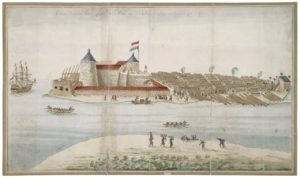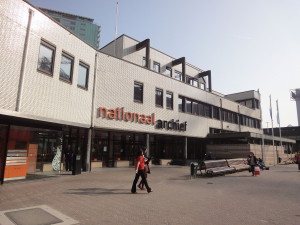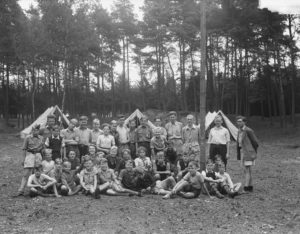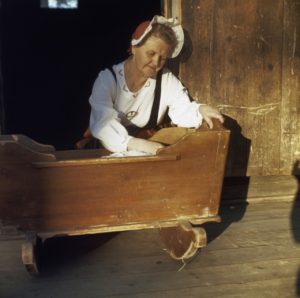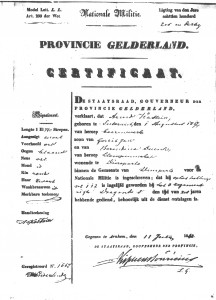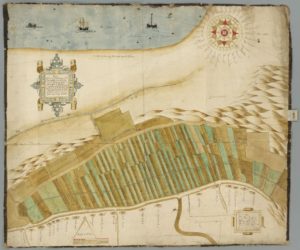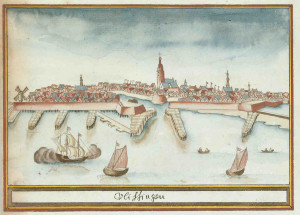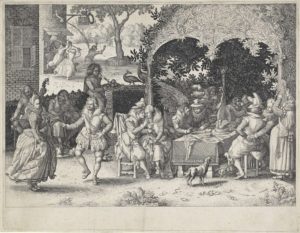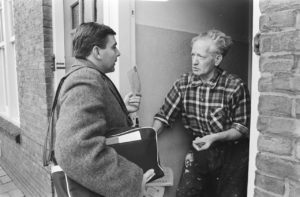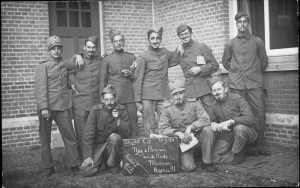Kolonie is the Dutch word for colony. As a result of the commercial activities of companies like the Dutch East India Company and West India Company, the Dutch had colonies and trade posts all over the world, including: New Netherland in North America, which covered large parts of the current states of New York and New Jersey, where the Dutch obtained furs. El Mina in Ghana, center of the Dutch slave trade in Africa. Cape of Good Hope in South Africa, important stopping point for … [Read more...]
Dutch Term – Archief
October is archive month, so this week's Dutch term is archief (archive). The word archief has two meanings: The repository that holds records A group of records created by a person or organization as a result of their activities. For example, the Nationaal Archief holds the archief (records) of the West India Company. … [Read more...]
Dutch term – Verzuiling
Verzuiling, literally: "pillarization," is the segregation of a society by religion or socio-economic background. By the late 1800s, the Dutch society become increasingly segragated. As a child of Roman Catholic parents, you would not just worship in the Catholic church, but you would also attend a Catholic school, sing in a Roman choir, and join a Catholic gymnastics club. When you grew up, you would vote for the Catholic party, joined the Catholic labor union, and later you would tune in … [Read more...]
Dutch term – Doodgeboren
Doodgeboren, literally "born dead," is the Dutch word for stillborn. Since the introduction of the civil registration, stillborn children who were born after 24 weeks of pregnancy only received a death record. As of 19 September 2016, parents can now also request that a birth record is drawn up. … [Read more...]
Dutch term – Signalement
Signalement is the physical description. You can often find signalementen in military records, prison records, or in police bulletins. It is rare to find a physical description for ancestors before say 1800. See a list of Dutch terms in physical descriptions for more information. … [Read more...]
Dutch term – Polder
A polder is a section of land that was claimed from the sea or marsh. This was traditionally done by building a dike around it the land and draining the water using mills. A polder will typically have many drainage canals crisscrossing the landscape. … [Read more...]
Dutch term – Haven
A haven is a harbor. The Netherlands had and has some of the largest harbors in the world. They provided work for a range of occupations, both for people working at sea like fishermen and skippers, and for people working in the harbor like merchants, innkeepers and carriers. The harbors of Rotterdam and Amsterdam were also major ports of embarkation for emigrants leaving western Europe for North America. … [Read more...]
Dutch term – Legitieme portie
The legitieme portie (legitimate portion) is the part of the inheritance that children are legally entitled to. Under Dutch law, at least since the 1800s, children cannot be disowned by their parents completely, even if the parent makes up a will. Their legitimate portion is half of what they would have inherited if there was no will. This is different than in Anglo-Saxon law, where the testator is free to divide their estate as they see fit, including disowning their children. For … [Read more...]
Source – Census records
The first nation-wide census of the Netherlands was held in 1795, during the French occupation. The first official Dutch census that recorded every individual was held in 1830 and was held every ten years. In 1850, the population register was introduced to keep the population information up-to-date in between censuses. Initially, the census was used to verify and correct the population registers. With the introduction of digital record keeping, this was no longer necessary so the decennial … [Read more...]
Dutch term – Broederdienst
Broederdienst literally means "brother service." It was a reason for exemption of military service. If a family had an even number of sons, half of them had to serve. If they had an uneven number of sons, the lesser half had to serve. The brothers who did not have to serve got an exemption for broederdienst. You will often find these exemptions listed in the marriage supplements. … [Read more...]
